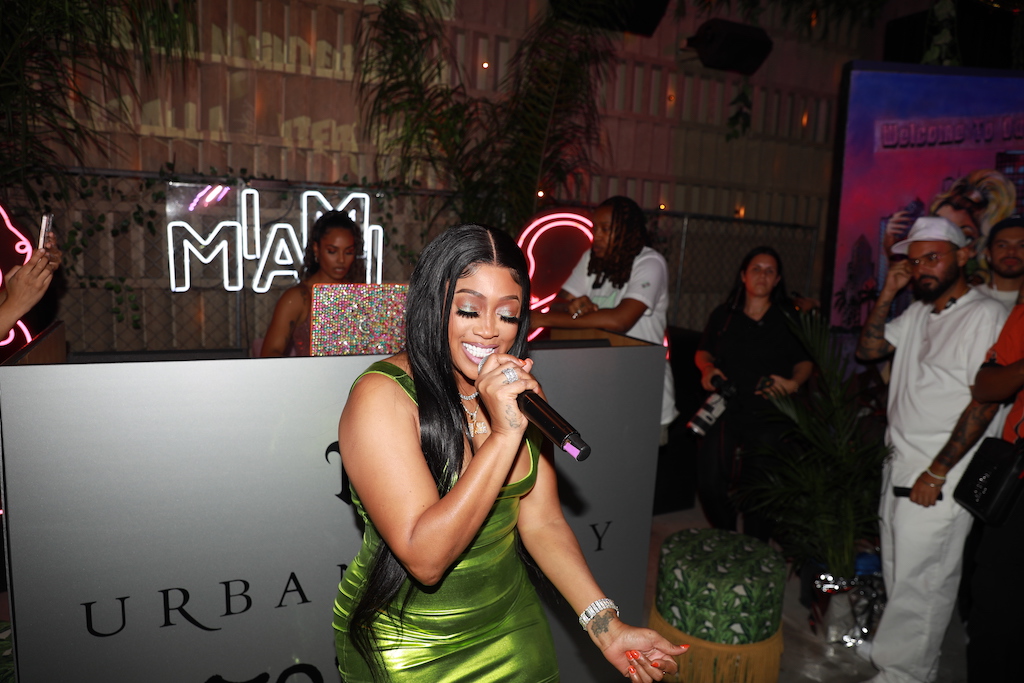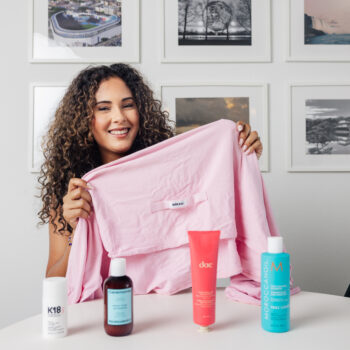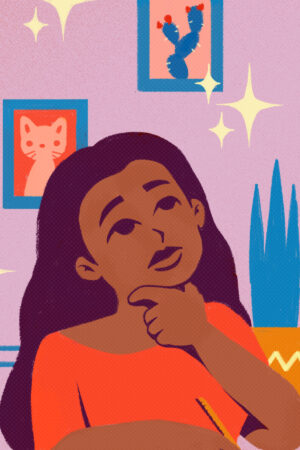Trina, the iconic rapper of Dominican and Bahamian roots, continues to remind people why she remains one of the most influential women in rap. Since the late ’90s, she has been pushing her music to the masses, and now, in celebration of hip-hop’s 50th anniversary, she still thinks that there are more women to celebrate.
It’s no secret that Trina is a fixture in the world of hip-hop. With hit singles like “Pull Over” and “Here We Go” featuring Kelly Rowland, Trina – born Katrina Laverne Taylor – cemented her name in the rap game. Along with these hits, the Miami-born rapper has also collaborated with A-list counterparts like Ludacris, Missy Elliot, and Diddy throughout her fruitful career. She’s also worked with newer artists like Latto on “Clap” and Saweetie on their remix for “B*tch From Da Souf (Remix)” – showcasing her ability to stay relevant in the ever-evolving and fast-paced music scene.
Not only was she one of the first women in the hip-hop/rap industry to make a name for herself, but she also did it with the unapologetic tracks that categorized her as one of the most authentic to have paved the way for women rappers today – regardless if listeners think her tracks are too raunchy and risqué.
Now, she’s inspiring emerging artists to follow her lead. At the Urban Decay event held in Miami, FL (Sept. 27) — that the brand put together to celebrate and honor the city’s authentic culture and creatives — Trina spoke to Remezcla’s editor-in-chief, Thatiana Diaz, about celebrating women in hip-hop (and what she hopes to see in the future), why she collaborated with Pitbull before crossover collaborations were a thing, and how she uses her Caribbean roots to influence her music. She also gets real about being a woman and how special that is above all.
Read more, ahead.
This interview has been edited and condensed for clarity.
It’s the 50th anniversary of hip-hop this year. Do you feel that women were included enough in the conversation and celebration of this anniversary? And what would you like to see of women in hip-hop for the next 50 years?
Women are definitely the main focus in hip-hop, of course. Even more now than then because there are so many more women. There are so many more artists that are coming out. There’s so much more platform for the artists to come out [on]. There are so many women now that are on the charts that are paving the way, that are joining forces that have made this a bigger entity than it was ever before. I would just love to see more women grace the covers, grace the stages, be the main acts, be the headliners instead of [just] one category. We got hip-hop, we got pop, we got R&B, we got dance. We have every type of culture that we have in music. I would love to see more women united in that because women do bring a majority of the best in music overall.
I felt like they did celebrate women [this year]. I felt like they could celebrate more. It’s so many more women. It’s almost undeniable to name all the women. You can’t leave out the decades before my generation. Starting from the top [and] then withering your way down, it’s too many women not to have more categories to celebrate us in these 50 years. That’s what I would love to see.

What I’ve loved about your music since day one is how unfiltered you are as a woman in music. And there are so many women who fear being unfiltered. What would be your advice to newer women coming in who have that fear?
Live in your truth, be fun, [and] be free. This is what music is. Music is a form of expression. It’s creative; it’s an art. I’m from Miami, it’s free. When it comes to music, it’s your struggle, it’s your success, it’s your triumphs, it’s your loss, it’s your happiness, it’s everything that you have in your life. You’re not [always] going to make happy music. Sometimes, there’s sad music, but it’s still all from the heart. That’s why it reaches people. It touches people. So you have to always live in your truth and just be free when it comes to music.
You were one of the first hip-hop artists to collaborate with Latine artists. You collaborated with Pitbull. What inspired you to take part in a collaboration like that, which hip-hop artists are only starting to do now decades later?
Pitbull came up in my era. This is my guy, my brother. We all came up at the same time. We all knew the same people. We all worked in the same studios. So, when I came up, he came up as well. I did a lot of records with him, and I just looked at him as family, and I supported his music; he supported mine. We never looked at it like, “Oh, you’re doing a Latino record.” It’s just like, “This is my brother. We are just in a studio making music. His music is different than mine, and I love it, and we’re going to collab.” It’s good to see it spreading out more and other people doing it. When I think about it, wow, we did this a long time ago.
How do you feel your Caribbean background has inspired your music?
A lot. It’s fun. It’s free. If you’ve never been to the Caribbean, you don’t know how they live. They party. It’s a beach life. When it comes to music, it’s just having fun when it’s Caribbean. Just that culture in itself of just the sound, the dance, the way it makes you feel. When I think of music, and I think of a beat or a song, and I’m in that vibe, it reminds me of just being Caribbean. You’re having fun, your hair is down, just feeling free. So, that’s how I associate the Caribbean in my music.
Whether with production or with your lyrics, where do you feel you’ve been the most underestimated as a woman in hip-hop?
There are so many songs that I created, like thousands of songs, but that’s not the perception of how I came in. “It was a man’s record. It was feisty, raunchy.” That’s just one record. And there are so many other records that are different from that. But people get accustomed to that. You don’t really get a chance to be anything else. But then we do a record with Kelly Rowland with “Here We Go” and change the dynamic of it. When you set the tone of being free, being expressive, saying what you feel unapologetically — that’s where the misconception [comes].
You’ve given us vulnerable, you’ve given us bad bitch, you’ve given us all the moods…
You’re not always in a bad bitch era. We’re very vulnerable creatures. We’re very emotional. Some days, you may want to have no makeup, wear pajamas, eat popcorn on the sofa [with] one of your homegirls, and talk about life. And it may not be the best, but that’s what it is. Life is life, but we’re women and the best creation of life – we create life. So, living that, we will go through the most feeling of everything. And that’s amazing.
You’re not always in a bad bitch era. We’re very vulnerable creatures. We’re very emotional. Some days, you may want to have no makeup, wear pajamas, eat popcorn on the sofa [with] one of your homegirls, and talk about life.
And you’ve managed to stay relevant for so many years, which is challenging to accomplish in this music industry. Why do you feel that you’ve been able to stay in this for so long?
Just being myself. True to myself. Living in my truth, having fun, having normal friends, having people where I’m not at work. When I’m not working, I’m hanging out with my friends. We’re on the beach, we’re at the spot. We’re just living real life with my friends. That’s how I relate it to music. We have good days; we have sad days. Some of my friends are married, some are divorced, and some are single. We talk about us, we laugh, we cry. So it’s a real form of being around just amazing people, great women.
Lastly, what is your message to artists coming out of Miami? We’re seeing more artists come out of here.
Have fun. You [are] from a great place. Even [in] the struggle, even [in] the great times, take the drive around our city. Go from Miami to Palm Beach and be creative, believing in what you’re doing, your craft. Have feeling; make it mean something. Stay focused. Your message could change a life. It could make a person who may not be in a great space mentally uplift themselves. Whether it’s too raw or whether it’s too vulnerable. We have those days. You have raw, unfiltered days and very vulnerable days where you are just being a woman or a man or whatever. But live in that, dive in that, feel that. Feel the space that you are in life and bring it out through music. Find a plan, [and] set a goal. Be creative. Take your craft seriously and put yourself in a place that you want to see yourself in – manifest it.







